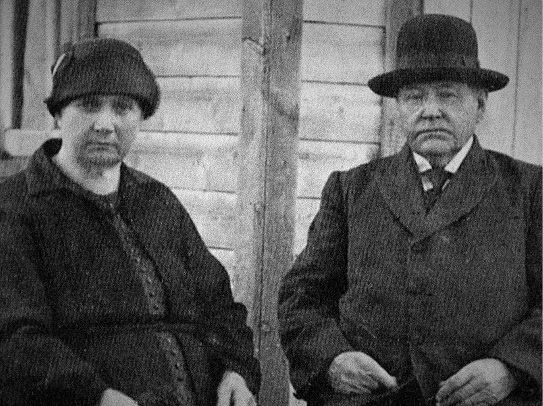Two Bergen Brothers and a Photograph
Leonard Doell
My paternal grandmother was Aganetha (Bergen) Doell, who died before I was born. In the early 1980s, I became interested in knowing more about my Bergen family history and relations. In the process, I found out that Aganetha was the ninth child born to Wilhelm and Helena (Funk) Bergen. Wilhelm was born in 1865 in imperial Russia and came to Canada with his parents Peter and Maria (Rempel) Bergen on the SS Dominion, which arrived in Quebec City on July 18, 1875. They went on to take up a homestead at Eichenfeld on the West Reserve in southern Manitoba. He was married to Helena Funk on October 6, 1889, the daughter of Jacob and Anna (Knelson) Funk of Shanzenfeld. The Funk family had come to Canada on the SS Sardinian on June 19, 1876.
In 1899, Wilhelm and Helena moved to the Old Colony village of Kronsthal, east of Osler, Saskatchewan. In 1908 they moved again, to an area south of Warman known as Clark’s Crossing. In the fall of that year, shortly after their move, Helena and her son Cornelius died. Thirteen children had been born to her. In 1909, Wilhelm married Mrs. Maria Schmidt (nee Teichroeb, married to David Schmidt), a widow who had two children from her first marriage, of which one died as an infant. Another seven children were born to the marriage of Wilhelm and Maria.

The Bergens continued to live at Clark’s Crossing until the death of Wilhelm in 1924. For many years he had been sickly, visiting both doctors and chiropractors. The main source of his health issues was an accident when he tried to stop a team of runaway horses pulling a buggy, and they ran over him. He died on February 28, 1924, of what was determined to be dropsy (a buildup of fluids in his body). Maria then moved to the Old Colony village of Neuhorst, west of Osler, where she died on January 16, 1948.
In addition to learning more about my immediate Bergen relatives, I also learned that my great-grandfather Wilhelm had a brother who never came to Canada with the rest of the family. To pursue this story, I made a trip to Central Haven Nursing Home in Saskatoon, following up on a tip that a Mr. Funk might know more about this family. After getting help at the nursing station, I walked down the hall and saw the name Funk on an open door. When I stopped to read the name, a woman sitting in a chair invited me to come in. She asked me who I was and whom I was looking for. Then I realized that I had not walked far enough and had stopped at the wrong room. I told her about my Bergen connection and she looked at me and said in Low German, “You and I are related!” It was the right room after all!
The woman with whom I was visiting happened to be Mrs. Maria Funk (nee Bergen, married to Abram Funk), the daughter of Jacob Bergen, my great-grandfather’s older brother. She then went to her photo album and took out a small tintype photo of an older man and a boy standing next to him who appeared to be his son. Maria told me about the significance of that photo.

Her father, Jacob Bergen, born in Rosenthal, Chortitza colony, in 1853, was the only child born to Peter Bergen and his first wife Katharina Berg. After the death of his mother, he went to live with his grandmother and his father remarried. He was raised by his grandmother, a small lady who was very old and sickly. She told him that there would come a time when men would fly in the air. When his grandmother died, he went to work for a Dr. Schellenberg. At first he took care of the horses and later the doctor let him help with rolling up pills in paper. One day he asked Jacob what he wished to do with his life and Jacob replied that he would like to become a school teacher. Dr. Schellenberg arranged for him to go to school and helped him get a scholarship. The scholarship stipulated that for every year of study he would have to teach two years. He studied for three years. After this he went to the village of Wiesenfeld to teach. Teachers would board in a different home each week. He ended up staying in the Neufeld home, where he met his future wife. After their marriage they moved to the nearby village of Prijut, where Jacob farmed and taught occasionally. He taught school for eighteen years.
Mrs. Funk explained that Jacob had not migrated to Canada with the rest of his family in the 1870s because his father-in-law, Peter Neufeld, had made him promise to stay in imperial Russia if Jacob married his daughter. Jacob was from a poor family and the Neufelds were well-to-do. Mr. Neufeld owned a lot of land and had many horses. Jacob eventually married Eva Neufeld in 1880, and kept his promise to stay.

Since he was determined to stay in imperial Russia, Jacob’s father, Peter Bergen, went to a photographer to have a photo taken so that Jacob would have a physical reminder of him. The tintype photo that Mrs. Funk showed me was the photo given by Peter to his son Jacob before leaving for Canada in 1876. The boy standing next to Peter is my great-grandfather Wilhelm Bergen.
Jacob and his wife Eva brought seven children into the world, of which six grew to be adults. Three remained single and three were married. Eva died on January 13, 1918, in Wiesenfeld. Jacob and his family immigrated to Canada in 1925. They came on the SS Montrose, which arrived in Canada at the port of Saint John, New Brunswick, on December 27. They then travelled by train to Winkler, Manitoba, where they were met and hosted by Jacob’s sister. The following year, Jacob and his family moved to Rabbit Lake, Saskatchewan, north of North Battleford.
In the fifty years that Jacob was separated from his family in Canada, he had periodic communication with them, some of which came through the Mennonitische Rundschau. In a letter to the Rundschau on April 8, 1903, Jacob asked for information about the death of his father in North America. He had heard this news through Herman Niebuhr and wanted it confirmed by one of his brothers. It was true that Jacob’s father had died in Manitoba, on September 18, 1902, some seven months earlier.
In another letter to the Rundschau on February 21, 1923, Wilhelm Bergen wrote that he had ordered the newspaper for his brother Jacob in Russia but had not heard if Jacob had received it or not. He asked if anyone could confirm this for him.
When Jacob and his family arrived in Canada in 1925, the majority of his siblings had already died. His brother Peter died in 1916, Diedrich in 1922, and Wilhelm in 1924. I am unsure of the death date of his sister Maria, who was married to Johan Janzen. The only remaining sibling was his sister Katharina, wife of Aeltester Jacob Heppner from Winkler. After his arrival in Canada, he stayed with the Heppners and later with a Penner family in Neuenberg. He then travelled to Saskatchewan with his son-in-law Abram Funk and visited with relatives, including his sister-in-law Maria Bergen, widow to Wilhelm, at Warman. Eventually they ended up at Rabbit Lake, where he lived with his children.

It was during the summer of 1926 that Jacob’s cousin Wilhelm Rempel of Rosthern had the opportunity to meet with him to talk about their childhood years together in imperial Russia. Wilhelm wrote about this joyous reunion in a letter to the Rundschau on August 25, 1926. They had not seen each other since the Rempel family left for Canada in 1878. Wilhelm concluded his letter with the exclamation “Wonderful God’s guidance!”(Wunderbare Gottesfuhrungen!).
Jacob Bergen passed away on May 16, 1927, at Rabbit Lake, Saskatchewan. At the age of seventy-three, the widowed Jacob left his beloved but troubled homeland in the Soviet Union for Canada. While he was not able to reconnect with many of his siblings, friends, or extended family, he was able to join his family in making a new start in a place of peace.
Leonard Doell is retired and lives near Aberdeen, Saskatchewan. He is an active member of the Mennonite Historical Society of Saskatchewan and enjoys doing genealogical research and learning about Mennonite and Indigenous history.
